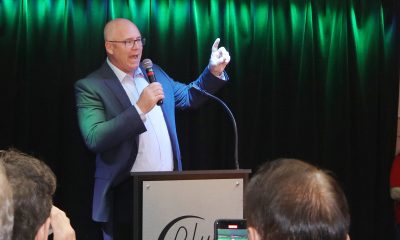Local
EXCLUSIVE: Mizeur eyeing run for Md. governor
Lesbian lawmaker says she would make ‘a good chief executive’
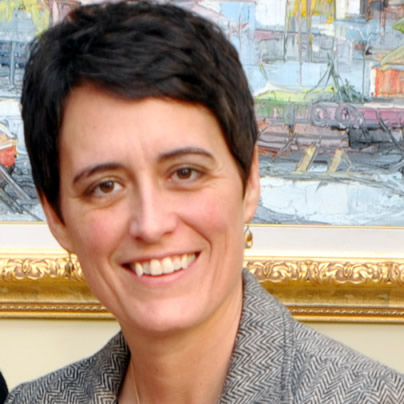
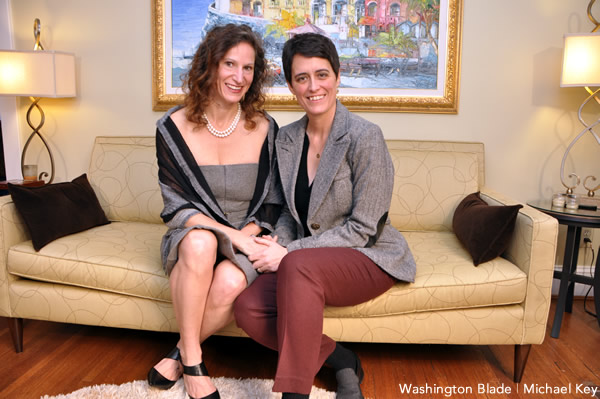
Heather (right) and Deborah Mizeur at their Takoma Park home. Heather is contemplating a run for governor. (Washington Blade photo by Michael Key)
Heather Mizeur, a lesbian member of the Maryland House of Delegates, said she’s seriously considering a run for governor in an exclusive interview with the Washington Blade this week.
“I’m taking a very serious look at it,” Mizeur said. “I can’t say for sure what 2014 is going to bring but … I know that I would make a good chief executive. I have good ideas for keeping Maryland moving forward.”
A run by Mizeur would mark another key milestone in the LGBT rights movement. If successful, she would be the first to win election as an openly gay candidate for governor in the country. Former New Jersey Gov. Jim McGreevey announced he is gay and then promptly resigned from office in 2004 after disclosing he’d had an extramarital affair with a male adviser.
Mizeur said she only recently began thinking of running and was inspired by the results of last week’s elections.
“Right now we’re taking stock of what happened in the last election,” she said. “It was incredible to see a big win with Tammy Baldwin being elected the first openly gay senator and Kyrsten Sinema making history in Congress. It really has inspired us to keep pushing forward. So, yes, I’m seriously considering running for governor because we need more diverse voices at that level of government.”
Mizeur, who turns 40 in December, is a Democrat who represents the 20th District, which includes Silver Spring, Takoma Park, White Oak and other areas in progressive Montgomery County. She was first elected to the legislature in 2006.
Marylanders will elect their next governor in November 2014. Democratic Gov. Martin O’Malley is serving his second and final term. Several high-profile figures are expected to run for the office, including Lt. Gov. Anthony Brown, Attorney General Douglas Gansler, Comptroller Peter Franchot and Howard County Executive Ken Ulman.
Mizeur’s potential competitors have a significant advantage when it comes to cash on hand. Gansler has more than $4 million in cash on hand as of an April report; Ulman had $1.3 million as of June; and Brown had $810,841 according to a January report. Records show Mizeur had about $216,000 in cash on hand, according to a January report.
“That’s one of the biggest things I’m weighing in deciding to get in the race,” she said regarding fundraising. “I only started thinking about this race recently and the other candidates planning to run have been planning to do this for a really long time so they have a head start in the money chase. I also spent 2012 raising money and working on winning Question 6, rather than raising money for myself.”
She added that she won’t get in the race unless she can be competitive financially. Mizeur would certainly tap a national network of donors from her seven years as a Democratic National Committee member and experience working on the Hill and on political campaigns. She worked for former presidential candidate Sen. John Kerry’s campaign and famously endorsed Barack Obama for president in 2008 after attracting national attention over whether she’d back him or rival Hillary Rodham Clinton. Additionally, a Mizeur candidacy would likely attract support from the Gay & Lesbian Victory Fund given the opportunity for a barrier-breaking race and from EMILY’s List considering there is only one Democratic female governor currently in office in the country. The Victory Fund endorsed her in 2006 and 2010 but said it is premature to discuss another endorsement at this time.
“At this point, our work to grow the number of out elected officials in America involves a lot of firsts, a lot of milestones,” said Victory Fund President and CEO Chuck Wolfe, when asked about a potential Mizeur run for governor. “One of those would obviously be helping to elect an out candidate as a governor, which has never happened. With more than 100 openly LGBT state legislators now in office, and the most-ever out members of Congress preparing to be sworn in, that day may come sooner than many imagine.”
When asked whether he had any thoughts about Mizeur’s potential gubernatorial campaign, O’Malley told the Blade on Tuesday, “Not really, I’m supporting Lt. Gov. Anthony Brown wholeheartedly for governor of Maryland.”
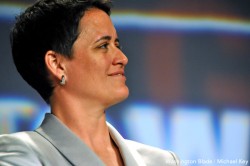
If she runs and wins, Heather Mizeur would be the first openly gay person to win a governor’s race in the country. (Washington Blade photo by Michael Key)
Mizeur declined to say when she expects to make a final decision on the race, noting that right now she’s dedicated to preparing for the upcoming legislative session in Annapolis. But to be competitive, she would likely need to make a final decision by early spring, just after the session ends.
“We have a robust slate of issues to address next year, including fracking, paid sick days for employees and job creation efforts,” she said.
Given the expected competition from a sitting lieutenant governor backed by the popular O’Malley — not to mention Gansler, who has long been vocal about his support for marriage equality — what makes Mizeur think she can compete?
“I’m out giving speeches and working with people across the state and they’re encouraging me to get in this race,” she said. “They’re telling me we need your passion and message — I’m not the candidate that’s just next in line or seeking a professional promotion; I’m out there expressing what I believe and trying to rally communities around those ideas and common purpose. And that’s where this came from — from the ground up.”
Some have speculated that Mizeur is positioning herself for lieutenant governor, a rumor that she dismissed with a curt, “I’m usually not a plan B person.”
Mizeur said Maryland’s next governor must focus on jobs and the economy. In a high-profile split with O’Malley earlier this year, she came out against ballot Question 7, which ultimately passed and allows for an additional casino to be built and for table games at existing casinos in the state.
“I spent a lot of time speaking against gaming as a failed form of economic development for the state and instead talked about a range of ideas for job creation — rebuilding schools, transportation is at a crisis point in the state … workforce development.” She said that construction of the Purple Line in the D.C. suburbs would create 27,000 jobs while Baltimore’s proposed Red Line would create another 15,000. She also noted that the state’s health care needs should bring another 120,000 related jobs over 10 years to the state. She has long worked on health-related issues and looks forward to playing a role in implementing the federal health care reform law.
Mizeur married her spouse, Deborah Mizeur, in 2005 at a ceremony along the Chesapeake Bay.
“We married in front of family and friends and God; we just didn’t get any rights associated with it,” she said. “Seven years later, here we are.”
The couple traveled to California and were married just before voters there enacted Proposition 8 in 2008, which ended same-sex marriage, though couples already wed remained legally married. She said they won’t have another ceremony now that Maryland has approved marriage equality, because their California marriage is now fully recognized here. The two live in Takoma Park with a dog, Chester, and two cats and own a consulting business, the Mizeur Group, which does federal policy analysis work. They also own an organic herb farm in Chestertown, Md.
She and Deborah spent election night at a Baltimore celebration along with O’Malley and Baltimore Mayor Stephanie Rawlings-Blake.
“Deb and I were all smiles — we hugged and embraced and said this is what a happy legally married couple looks like,” she said, upon hearing that Question 6 passed. “It’s still hard to put into words. You never want to have your civil rights put to a majority vote but it was incredibly fulfilling knowing that Marylanders across the state … stood up to do the right thing.”
The battle over Question 6 was a contentious one with a diverse coalition of in-state and out-of-state groups claiming a piece of the credit for its passage, sometimes leading to heated accusations. One advocate, who spoke on condition of anonymity, accused Freedom to Marry’s Evan Wolfson of telling a “big fat lie” when touting his organization’s contributions to the fight. Josh Levin, campaign manager of Marylanders for Marriage Equality, said that although Mizeur was helpful, she could have done more.
“Del. Mizeur helped raise some money for the campaign, but wasn’t closely involved,” Levin said. “She helped with a few events, but others did far more and her attention was clearly more focused on other priorities, including a potential statewide run.”
Mizeur disputes that characterization, noting her participation in fundraising events, testifying on behalf of the bill and delivering an emotional floor speech prior to the vote. Mizeur said she and the other seven openly gay and lesbian members of the state legislature devoted much of 2012 to the marriage cause.
“Each of us was working hard in our own way,” she said. “My entire public schedule was Question 6-related for months.”
With that fight over, she said the next job for the state’s LGBT advocates is to push for non-discrimination protections based on gender identity and to work on causes important to those who joined the coalition for marriage equality.
“It’s important for our community to be seen as coming together to work on issues that are outside LGBT priorities,” she said. “We only won Question 6 because we had an amazing coalition that crossed party lines, age, race. We can’t just be seen as fighting for this form of equality and turning a blind eye to other causes.” She cited hunger, school achievement gaps, living wage and reforming the criminal justice system as priorities.
Mizeur talks openly about her Catholic faith but said she did not encounter any anti-gay sermons over the marriage issue this year because she goes to parishes run by Jesuits who are more progressive. Despite the Catholic Church’s prominent role in funding anti-gay causes around the country, Mizeur contends it’s important not to abandon the church.
“We have to fight for change from within,” she said. “If all progressive Catholics left, there’d be no reason to live up to the church’s potential.”
Mizeur was raised in a tiny farming community in rural Illinois called Blue Mound, population 1,100. She’s from a fifth generation farming family, but her father was a factory worker and UAW member his entire career. She spent time with him on picket lines, which helped inspire her pursuit of public service.
The experience of walking picket lines “taught me the value of sacrifice and hard work and standing up for the courage of your convictions,” she said. “Catholic teachings on social justice also inspired me.”
Michael K. Lavers contributed to this report.
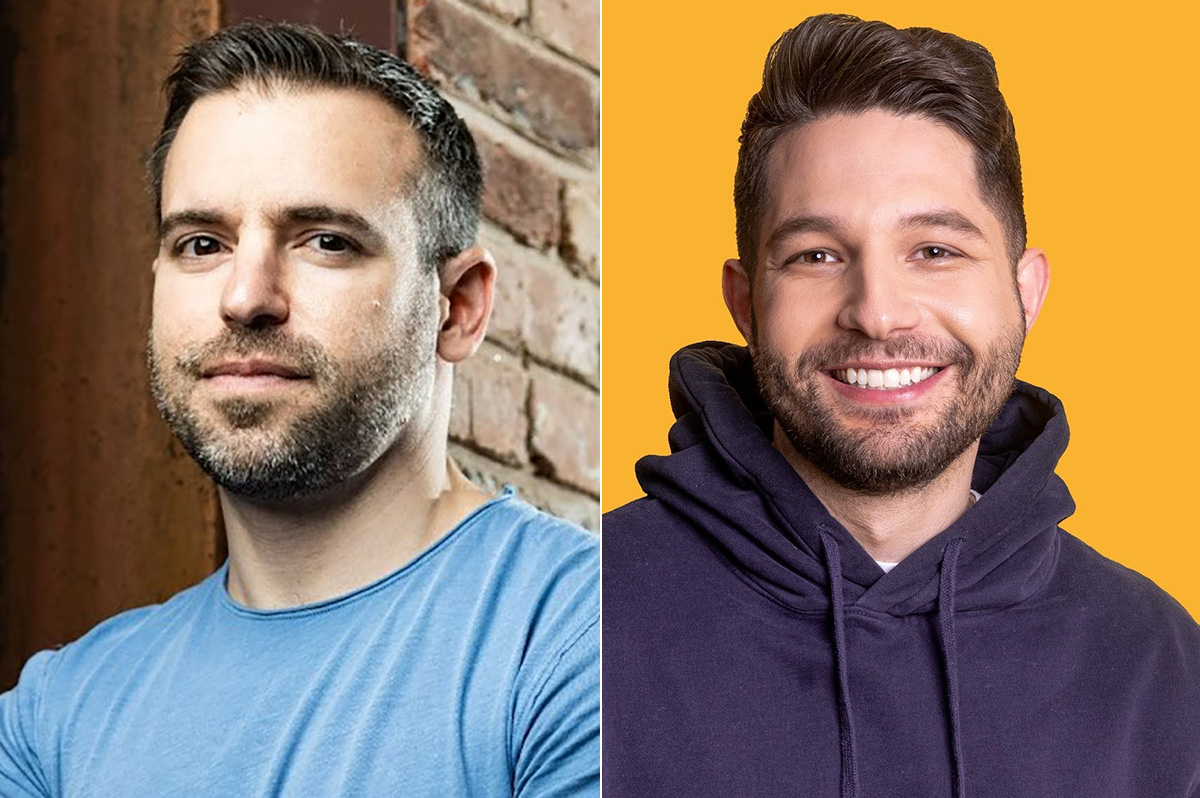
The Comings & Goings column is about sharing the professional successes of our community. We want to recognize those landing new jobs, new clients for their business, joining boards of organizations and other achievements. Please share your successes with us at [email protected].
Congratulations to Chrys Kefalas and Salah Czapary on their new venture, the Yala Greek Ice Cream Shop, which will open in Georgetown, at 3143 N St. N.W., around July 4.
Kefalas is the CEO and founder, Czapary is the co-founder/director of experience and operations. The third co-founder is Steve Shyn, COO. From what I hear Chrys and Salah will at times both be doing the scooping to the lucky people who stop by their shop. The word “Yala” is a play on the Greek word for “milk,” and fittingly, Yala Greek Ice Cream is made using hand-crafted techniques passed down through three generations of Greek ice cream makers.
Kefalas told the Blade, “This is not frozen yogurt, just inspired by Greek flavors or a trendy twist on gelato. This is true Greek ice cream, finally making its American debut. It is crafted with farm-fresh milk from Maryland, Greek yogurt and honey, fruit preserves from the Mediterranean, and ingredients sourced directly from Greece, Italy, and the Middle East, including premium pistachios and sustainably harvested vanilla.”
The two come from different backgrounds. Kefalas has a family in the restaurant business but is currently the head of the brand division at the National Association of Manufacturers. He is a former Justice Department attorney; worked as Attorney General Eric Holder’s speech writer; Gov. Bob Erlich’s counsel in Maryland; and ran for U.S. Senate in Maryland (endorsed by the Baltimore Sun). Born and raised in Baltimore, he’s a Washingtonian of nine years. He told the Blade, “Yala Ice Cream is a tribute, a legacy, and a love letter across generations.” He spent his early years working in his grandfather’s restaurant in Baltimore, Illona’s. Kefalas hopes, “Just like Greek yogurt changed everything, Greek ice cream is going to set the new standard for ice cream. But, for us, it isn’t just about ice cream; it’s about making my Papou, my grandfather, proud.”
Many people in D.C. know Czapary. He is the son of a Palestinian refugee, and Hungarian immigrant, and a longtime Washington, D.C. resident. Czapary served as a police officer and community engagement leader with the MPD. He then ran for D.C. Council, and although didn’t win, was endorsed by the Washington Post. After that race, D.C. Mayor Muriel Bowser realized how accomplished he is and asked him to join her administration, where he served as director of the Mayor’s Office of Nightlife and Culture.
Czapary told the Blade, “We’re bringing the first authentic Greek ice cream shop to the U.S., and we’re doing it with heart. We’re building a space where kindness, community, and a scoop of something extraordinary come together. Our Georgetown scoop shop is designed to be a welcoming haven where every guest feels a sense of belonging.”
Delaware
Delaware Senate passes bill to codify same-sex marriage
Measure assigned to House Administration Committee
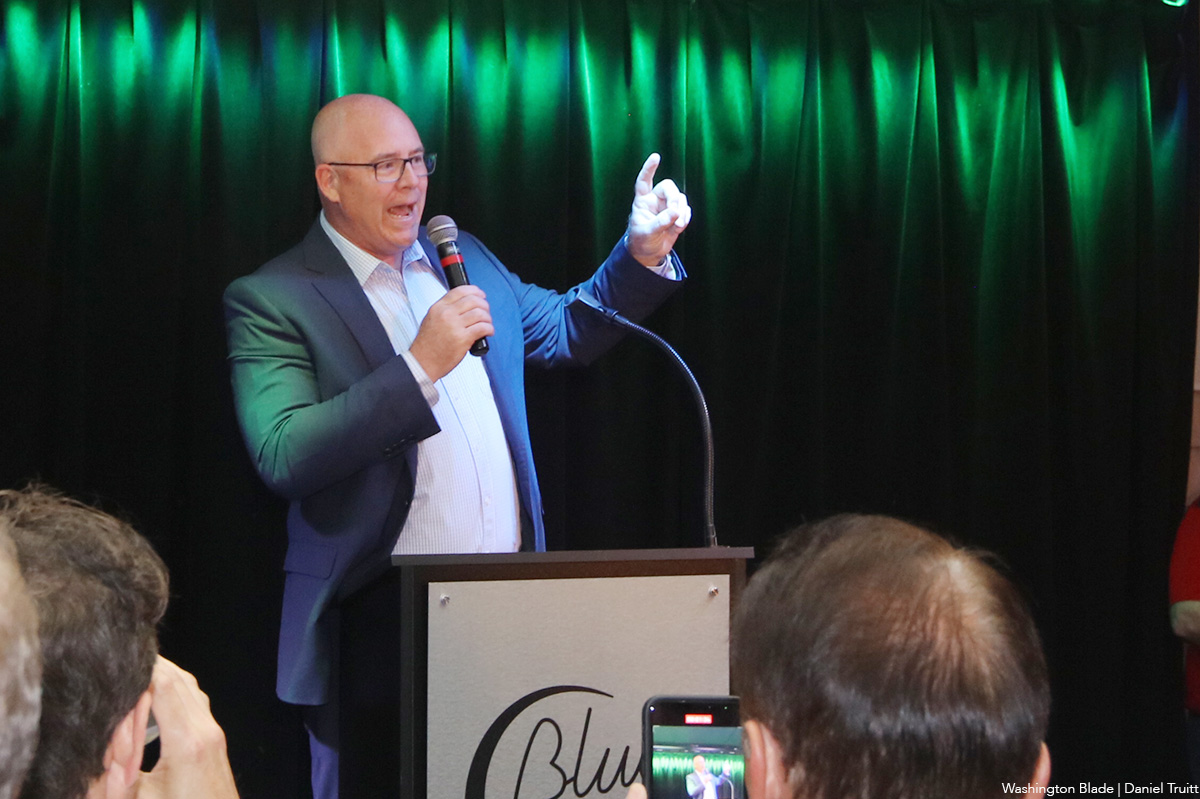
The bill that would enshrine same-sex marriage into Delaware’s Constitution passed the State Senate Tuesday afternoon.
Senate Substitute Two for Senate Bill 100 passed with a 16 to 5 vote, garnering the two-thirds majority necessary to pass. The bill has been assigned to the House Administration Committee.
SB 100 was introduced in April by Democratic Sen. Russ Huxtable of the sixth district of Delaware. It is the first leg of an amendment to the Delaware Constitution. The act would “establish the right to marry as a fundamental right and that Delaware and its political subdivisions shall recognize marriages and issue marriage licenses to couples regardless of gender.”
Senate Substitute One was adopted in lieu of the original bill on May 16. SB 100 originally focused exclusively on marriage equality relating to gender and the bill was tweaked to include protection for all classes that fall under Delaware’s Equal Rights Amendment, including race, color, national origin, and sex. Senate Substitute Two was then adopted in lieu of SB 100 on June 5 after being heard by the Senate Executive Committee on May 21.
SS 2 differs from SB 100 by clarifying that the right to marry applies to marriages that are legally valid under the laws of Delaware and that all state laws that are applicable to marriage, married spouses, or the children of married spouses apply equally to marriages that are legally valid. It also removed the need for gender-specific provisions by including gender in the first sentence and revised the language clarifying that the right to marry does not infringe on the right to freedom of religion under Article One of the Delaware Constitution.
“We’re not here to re-litigate the morality of same-sex marriage. That debate has been settled in the hearts and minds of most Americans, and certainly here in Delaware,” Sen. Huxtable said at Tuesday’s hearing. “We are here because the fundamental rights should never be left vulnerable to political whims or the ideological makeup of the U.S. Supreme Court.”
Other states such as California, Colorado, and Hawaii have introduced and passed similar bills to protect the right of all people of all genders to marry under state law.
“This bill sends a strong message that Delaware protects its people, that we will not wait for rights to be taken away before we act,” Sen. Huxtable said at the hearing. “Voting in favor of this amendment is not just the legal mechanism of marriage, it’s about affirming the equal humanity of every Delawarean.”
World Pride 2025
WorldPride recap: Festival, parade, fireworks, and Doechii
D.C. turned out for a massive celebration tempered by new political realities
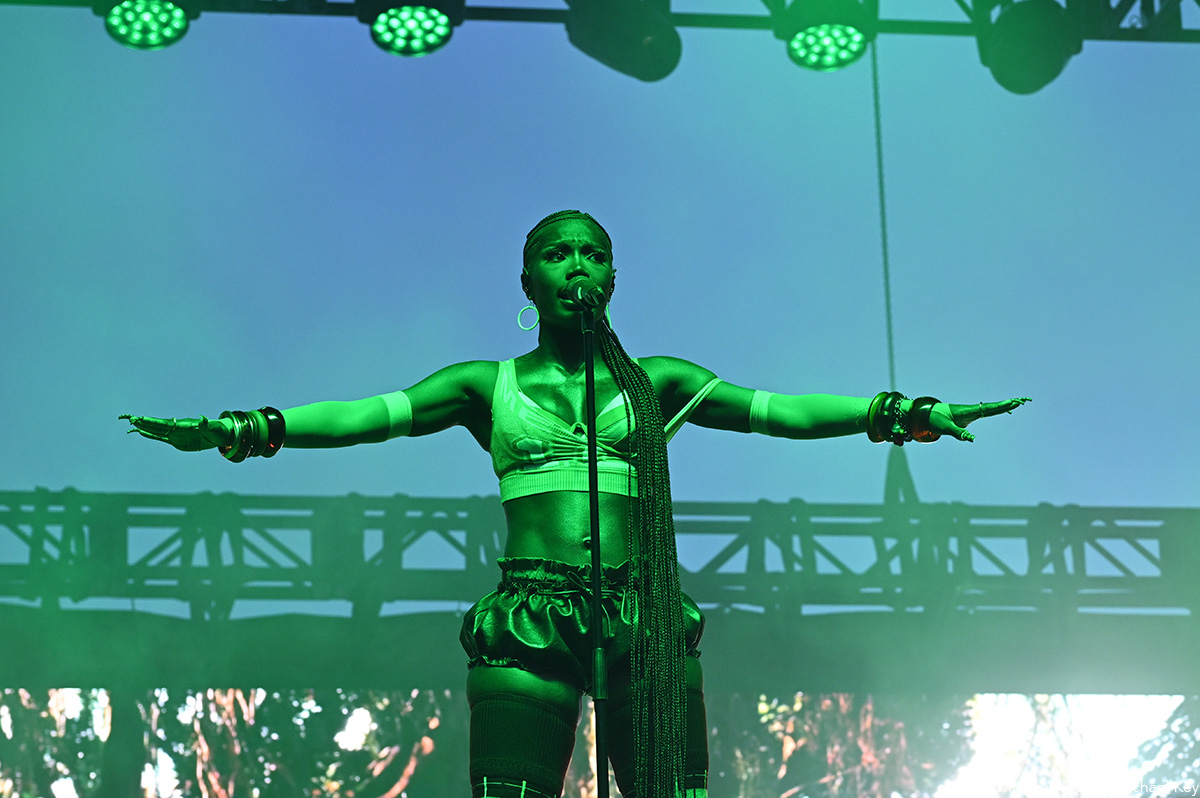
From Spain to Saint Lucia, Berlin to Brazil, travelers from around the globe began to arrive in Washington, D.C., for the biggest celebration of the LGBTQ community of the year. After two years of planning, over the course of nine days, one unified message of the strength of love against bigots that oppose the LGBTQ community emerged as WorldPride took over the city last week.
The long road to the successful events wasn’t met with open arms, though. As Donald Trump was elected president the year prior, the political climate in the U.S. became even more polarized, with the LGBTQ community — and trans people specifically — becoming targets for far-right figures.
This made it more difficult to ensure the safety of our transgender siblings within the LGBTQ community, especially while traveling to a city led by someone who has openly claimed them as enemies. InterPride, the group that runs WorldPride celebrations across the globe, even issued travel advisories for transgender and nonbinary people.
Additionally, the U.S. Park Service fenced off Dupont Circle — one of the centers of Washington’s LGBTQ community — just days before the celebrations began. After massive pushback, they took down the fences and allowed people to use the circle as a place to celebrate.
Despite the fears, scores of LGBTQ people poured into the capital just as rainbow banners, flags, posters, and messages of love and support covered every part of the city.
The long list of celebrations was supposed to begin on May 31 with a concert from Colombian pop superstar Shakira at Nationals Park.
“Due to circumstances beyond my control, I am sad and heartbroken that I will not be able to be in Washington, D.C., with you tomorrow,” said Shakira in a statement online. “I hope that I can come back to D.C. as soon as I am able.”
The event was intended to serve as both a concert and the welcome ceremony for WorldPride Washington 2025. Yet, less than 48 hours before she was supposed to mark the beginning of the global LGBTQ festival, she abruptly canceled, citing issues with her stage.
Despite the shaky start to the celebration, there was still music heard in the city — and not just Chappell Roan’s “Pink Pony Club,” which jumped to 16 on the U.S. Spotify streaming charts. Singers from all backgrounds joined the Gay Men’s Chorus of Washington to celebrate the “Freedom to Sing” in the International Choral Festival — spanning 17 days and numerous venues.
Sports also had its moment at WorldPride this year. The Capital Cup Sports Festival, produced by Team DC, works to end discrimination against LGBTQ people participating in sports and awards scholarships to local LGBTQ student-athletes. The sports festival included 15 different sports competitions across three days — from rugby to rowing.
There was also the WorldPride Film Festival, where filmmakers worldwide were encouraged to submit LGBTQ films of all genres and lengths to be screened during the WorldPride celebrations. From classic shorts like DC Gay Pride 1978 (1978), showcasing what Pride was like in the same city 46 years ago, to world premieres like Humans of Pride (2025), there was a myriad of motion picture art that showcased the LGBTQ community.
As the fight for LGBTQ rights began to shift from the street with bricks to the halls of parliaments and presidents’ offices around the globe, the focus turned to fighting for legislatively ensured human rights. To ensure that LGBTQ and minority rights are preserved in countries where they exist and to attempt to expand them in places without protections, the WorldPride 2025 Human Rights Conference launched.
For three days, upwards of 800 people — most of whom have devoted their careers to creating a world where “dignity, equality, and respect” are at the foundation of governments — gathered. Speakers like Jessica Stern, Spanish Sen. Carla Antonelli, Peruvian Congresswoman Susel Paredes, and Mariann Edgar Budde of the National Cathedral of Washington were just some of the notable attendees.
The Pride celebrations really ramped up just as the Human Rights Conference started to wind down. On Friday, June 4, multiple parties began — including the sixth annual Pride on the Pier celebration (presented by the Washington Blade). This year, it was extended from one to two days in honor of WorldPride. On Friday, The Wharf in Southwest D.C. hosted a night of vendors, food, drinking, dancing, DJs, and — for the first time — a boat parade. Boats with LGBTQ people in their proudest outfits danced and waved up and down the river.
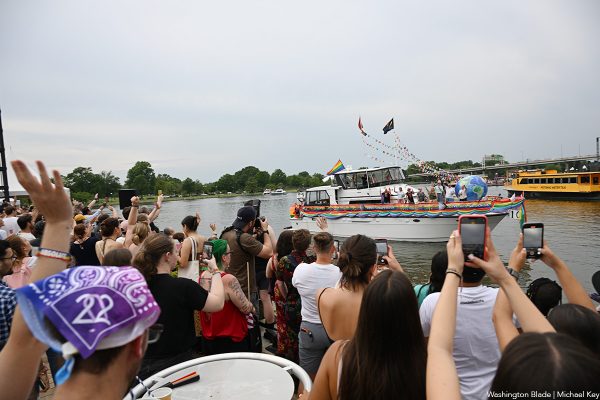
Another highly anticipated event was the WorldPride Music Festival: Global Dance Party. This mega two-day event brought together LGBTQ icons from a slew of styles like house, pop, drag, circuit, and techno. Performers — some of which included headliners Jennifer Lopez and Troye Sivan, Reneé Rapp, Kim Petras, Purple Disco Machine, RuPaul, Betty Who, Tinashe, and local talent like Ed Bailey, Fish House Funk, Dickerman, and Miscalculated — performed at the RFK Festival Grounds.
In addition to the Music Festival, there were two official WorldPride parties on Friday. “Full Bloom” brought together some of the East Coast’s most “iconic queer collectives and performers” — Flower Factory and Sweet Spot — with Capital Pride Alliance to host the dance party of the season. Floral outfits, carnival games, and a lot of sweaty dancing as far as the eye could see were the vibe of the night.
“I am at Full Bloom having so much fun. It feels like a county fair, but for gay people, and I’m having a blast with my community,” said Henry Hicks, a journalist originally from Tennessee.
“Queerness is about so much more than being able to get married and own property, queerness is about community. It’s about justice. It’s about liberation, and I feel like the ability to convene and express ourselves and really celebrate who we are outside of the confines of structures and institutions.”
Also happening at the same time was the “Woven Together” party by Daryl Wilson Promotions, set to celebrate the Black LGBTQ community with “energy, the music, the fashion, and the men — all under one roof.” The party took place at The Park on 14th and, as advertised, was filled with energy, music, bold fashion, and men.
On Saturday the 7th, Pride started just early enough to get a quick Bloody Mary in before the big events. The WorldPride Street Festival opened at 11 a.m., and included hundreds of booths — from vendors to nonprofits — and even a space for LGBTQ families to gather and allow their children to have their own space. The festival had something for everyone.
As street festival attendees set up their booths hours before, people further northwest began to prepare for the biggest Pride parade in Washington’s history. With more than 300 contingents and 40,000 people marching in the parade alone, it’s safe to say 14th Street had never seen this many LGBTQ people and allies.
Led by a 1,000-foot rainbow flag and Grand Marshals Renée Rapp and Laverne Cox, to say it was a party would be an understatement. It was a cacophony of sound and rainbow sights that included people shouting messages of love in nearly every language. Tequila shots were shared in flasks on the curb while people dressed in everything — from full leather outfits complete with pup masks to pasties, jockstraps, and fishnets. The parade was a true display of queer individuality and joy.
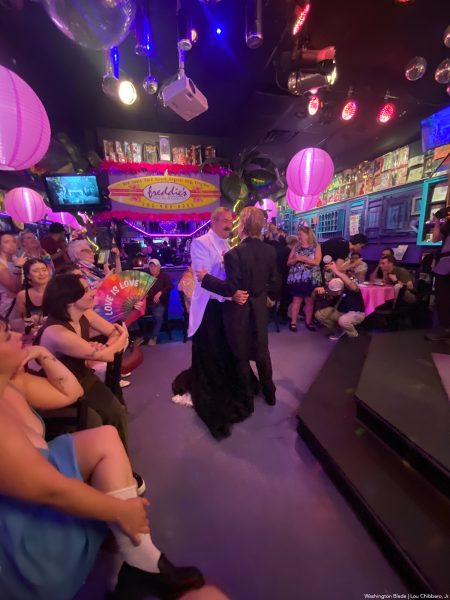
A special local legend got married during the parade — Freddie Lutz of the Northern Virginia gay bar Freddie’s married his partner of 28 years, Johnny Cervantes, while riding down 14th Street in a chapel float. The couple celebrated their wedding shortly after at Freddie’s, where parade and WorldPride attendees were invited to join them.
Another part of Washington’s Pride celebrations — the 17th Street Block Party — also began to ramp up as the parade made its way down 14th Street. The annual party, taking place in the city’s first “gayborhood,” was alive with drag performers, friends taking pictures and sipping drinks, and lovers wearing their queerness on their sleeves — or in many cases — sleeveless tank tops.
“We are gangbusters on 17th Street — it is amazing,” said Georgia Katinas, whose family owns and runs Annie’s Paramount Steakhouse, a cornerstone of the Washington LGBTQ community since its opening 76 years ago. “It’s been hot like this since we opened at noon, packed full of the most diverse, wonderful people we’ve ever met. We are so happy.”
Randy Downs, who soft-launched his and his boyfriend Rick Bennett’s pizza place, Protest Pizza, just for the Pride celebration, shared how he felt opening a queer-run restaurant at the peak of Pride.
“It’s busy, non-stop, and incredible,” Downs said. “The energy is amazing and the block party is incredible as well. It hasn’t hit home yet.”
As the sun dipped lower in the sky, the parade began to wind down—six hours after it kicked off at 2 p.m. The energy from the march spilled directly into the street festival, blending into one big, joyful queer celebration. Down Pennsylvania Avenue, performers delivered some of the greatest—and gayest—shows of their careers. Kristine W, CeCe Peniston, and David Archuleta lit up the stage, framed perfectly by the Capitol dome. The night wrapped with a show-stopping performance by Cynthia Erivo who, from afar, looked like she just might have been defying gravity.
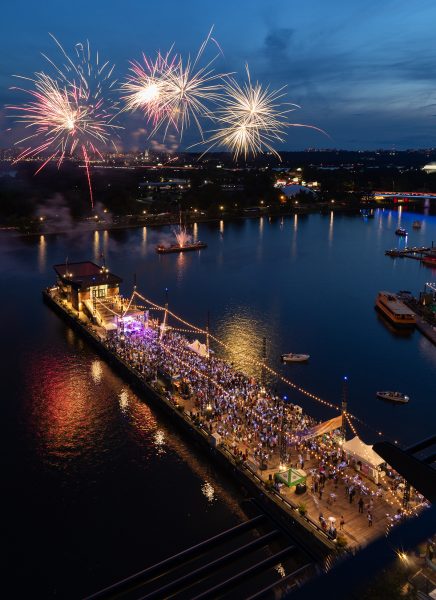
While Erivo lit up the Capitol Stage, fireworks burst over The Wharf for the second night of Pride on the Pier. Booms, “oooohs,” and “ahhhhhs” echoed along the river as the sky exploded in every color of the rainbow. Before and after the dazzling display, DJ Farrah Flosscett kept the energy high with a set full of queer pop anthems, spinning under the open sky.
Later that night, the Sapphic side of the LGBTQ community came out strong for “Unraveled: Women’s Party” at The Park at 14th. An all-female DJ lineup took over the four-story bar, filling each level with music as Harlem star Jerrie Johnson hosted the event for a crowd of more than 5,000 queer women, femmes, trans, and non-binary baddies who showed up—and showed out.
Kinetic Events have become a cornerstone of the D.C. circuit scene, so it was only fitting that the “Fabric of Freedom” party would close out the weekend with a bang. Hundreds of mostly scantily clad men—dressed in harnesses, jockstraps, and not much else—descended into Burhta for a night of sweat, bass, and liberation. Queer stars Pabllo Vittar and Alyssa Edwards (RuPaul’s Drag Race) headlined the night, alongside a stacked roster of DJs and go-go boys who kept the massive space—three dance floors and 10,000 square feet—alive until the early morning hours.
The next day at 9:30 a.m., folks started to gather on the steps of the Lincoln Memorial to get ready for the International Rally + March on Washington for Freedom. As the speakers began to arrive and check in, other event organizers started passing out signs. The rally and march, which lasted more than four hours despite the rain, had an impressive turnout.
The L.O.V.E. WorldPride Chorus started the event, performing “Freedom” in bright pink shirts on the memorial’s steps, followed by Dee Crank of the Navajo Nation. There, she spoke about her experiences being a trans Indigenous woman and encouraged everyone to listen to those who are most oppressed. “The fight for freedom starts with listening,” Crank said.
Ashley Smith, Capital Pride’s board president and a board member of the Human Rights Campaign Foundation, followed. He spoke with ferocity as he explained that now is the time to stand up for what’s right—especially for our trans siblings who are being ostracized by people a few thousand yards away in the White House and Capitol.
Multiple other speakers came up and spoke as the sky got darker and the rain began to fall, but amazingly—the crowd didn’t seem to dwindle.
Among the notable speakers, activist and comedian Mimi Gonzalez came out and sang a modernized version of “I Will Survive” by Gloria Gaynor.
“At first I was afraid. I was petrified. Kept wondering, ‘What in the world are they thinking? D.C. for WorldPride?’” Gonzalez sang-spoke as laughter rose from the crowd. “Consider this country’s leader who wants to rid the world of us—even he’s a little queer, having just broken up with Musk! Gay boys, lesbians, and trans. Look around the rainbow world, holding hands. So much love and unity, so much power when we’re one. There’s no stopping all of us. Our love outshines the sun,” she sang as cheers from the crowd grew louder.
For four hours, speakers from all walks of LGBTQ life came and spoke—Tyler Hack from the Christopher Street Project emphasized the importance of supporting politicians who are looking out and working on behalf of trans Americans. Kamala Harris made a video telling the LGBTQ community to keep the faith and to keep fighting. Even multiple RuPaul’s Drag Race stars came out—including Mrs. Kasha Davis, who spoke with the Blade after getting off stage.
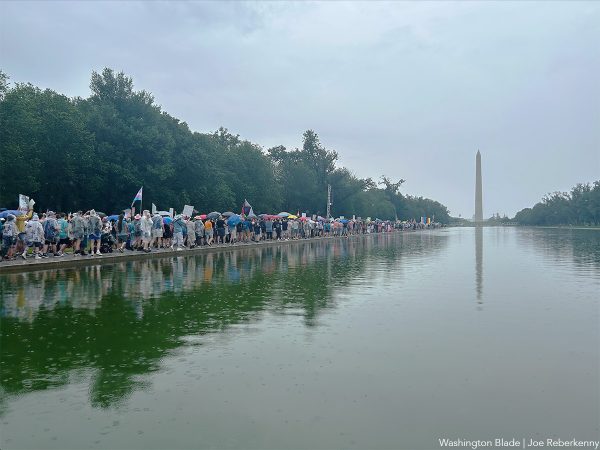
“The political nature of this is that we’re in this period of negativity and of hate, and what we need to do is show up for one another,” the drag queen said as her rainbow leopard print dress and gigantic pink updo stood out against the marble of the monuments around her. “And what we really need is more of our allies to continue to show up. And I mentioned in my talk about painting your nails. I mean, any way that you can show up to support your family, your neighbors, your community. That’s what this is all about. Because we’re finding that more and more people are not siding with that hate. Yes, the conservatives are loud, but we can be louder.”
As the group from the rally began to walk toward the Washington Monument, chants supporting trans kids and keeping LGBTQ people safe could be heard from yards away. The rainbow-clad group, holding umbrellas and signs, made their way down the Mall until they met up with Pennsylvania Avenue, as the final event of WorldPride took place.
The closing concert took place at the end of the WorldPride Street Festival once again, as MkX, Parker Matthews, 2AM Ricky, and Brooke Eden sang their hearts out to the growing crowd. Just as the sky began to clear up, one of the headliners of the night, Khalid, started his set and performed his radio hits.
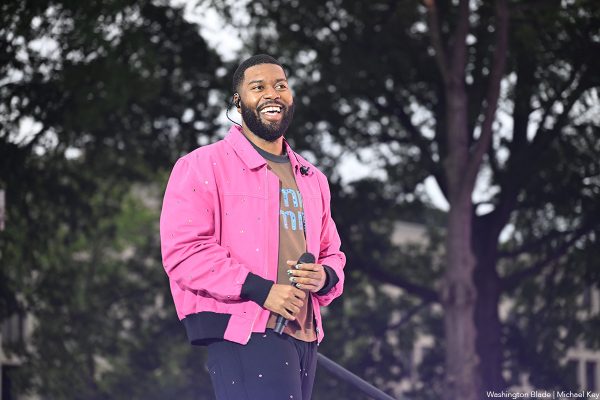
Doechii, the Grammy-winning performer, sang and rapped her most popular songs from her mixtape Alligator Bites Never Heal. She performed in true Doechii style, exuding confidence and love under the rainbow lights, ultimately finishing with an encore of “Nissan Altima.”
“I love y’all,” she said into her alligator-green microphone, walking back into her swamp-inspired set. “What are y’all doing after this? Are y’all partying? I want to party! I’ll see y’all later!”
-
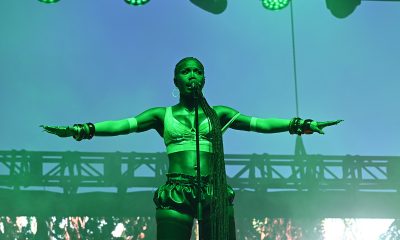
 World Pride 202522 hours ago
World Pride 202522 hours agoWorldPride recap: Festival, parade, fireworks, and Doechii
-

 U.S. Federal Courts1 day ago
U.S. Federal Courts1 day agoJudge temporarily blocks executive orders targeting LGBTQ, HIV groups
-

 Photos1 day ago
Photos1 day agoPHOTOS: WorldPride Parade
-
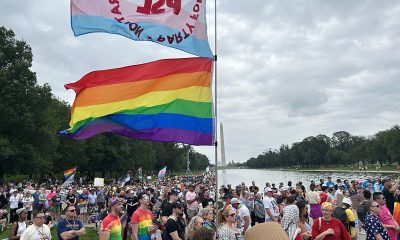
 World Pride 20254 days ago
World Pride 20254 days agoLGBTQ voices echo from the Lincoln Memorial at International Rally for Freedom



